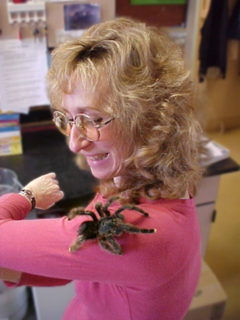A Quote by Isaac Bashevis Singer
As often as Herman had witnessed the slaughter of animals and fish, he always had the same thought: in their behavior toward creatures, all men were Nazis.
Related Quotes
As often as Herman had witnessed the slaughter of animals and fish, he always had the same thought: in their behavior toward creatures, all men were Nazis. The smugness with which man could do with other species as he pleased exemplified the most extreme racist theories, the principle that might is right.
As often as Herman had witnessed the slaughter of animals and fish, he always had the same thought: in their behaviour toward creatures, all men were Nazis. The smugness with which man could do with other species as he pleased exemplified the most extreme racist theories, the principle that might is right.
Whenever and wherever men have engaged in the mindless slaughter of animals (including other men), they have often attempted to justify their acts by attributing the most vicious or revolting qualities to those they would destory; and the less reason there is for the slaughter, the greater the campaign for vilification.
Humans — who enslave, castrate, experiment on, and fillet other animals — have had an understandable penchant for pretending animals do not feel pain. A sharp distinction between humans and 'animals' is essential if we are to bend them to our will, make them work for us, wear them, eat them — without any disquieting tinges of guilt or regret. It is unseemly of us, who often behave so unfeelingly toward other animals, to contend that only humans can suffer. The behavior of other animals renders such pretensions specious. They are just too much like us.
Human relationships with predators have always been thorny. Predators are the first creatures our kind purposely eradicates. Too often, people feel humans are and should be in control; we are enraged to discover this is not true. And when other creatures share our appetites and kill our livestock (often animals we were raising to kill, ourselves), we call them vandals and murderers...Predators are the most persecuted creatures on Earth.
The country and culture commonly known as "America" had had a badly split personality all through its history. Its overt laws were almost always puritanical for a people whose covert behavior tended to be Rabelaisian; its major religions were all Apollonian in varying degrees---its religious revivals were often hysterical in a fashion almost Dionysian.
Once the war began, the government could do anything 'necessary' to win it; so it was with the 'final solution of the Jewish problem,' which the Nazis always talked about but never dared undertake, not even the Nazis, until war and its 'necessities' gave them the knowledge that they could get away with it. The people abroad who thought that war against Hitler would help the Jews were wrong. And the people in Germany who, once the war had begun, still thought of complaining, protesting, resisting, were betting on Germany's losing the war. It was a long bet. Not many made it.
Without any extraordinary effort of genius, I have discovered that nature was the same three thousand years ago as at present; that men were but men then as well as now; that modes and customs vary often, but that human nature is always the same. And I can no more suppose, that men were better, braver, or wiser, fifteen hundred or three thousand years ago, than I can suppose that the animals or vegetables were better than they are now.
But complex animals had obtained their adaptive flexibility at some cost--they had traded one dependency for another. It was no longer necessary to change their bodies to adapt, because now their adaptation was behavior, socially determined. That behavior required learning. In a sense, among higher animals adaptive fitness was no longer transmitted to the next generation by DNA at all. It was now carried by teaching.




































